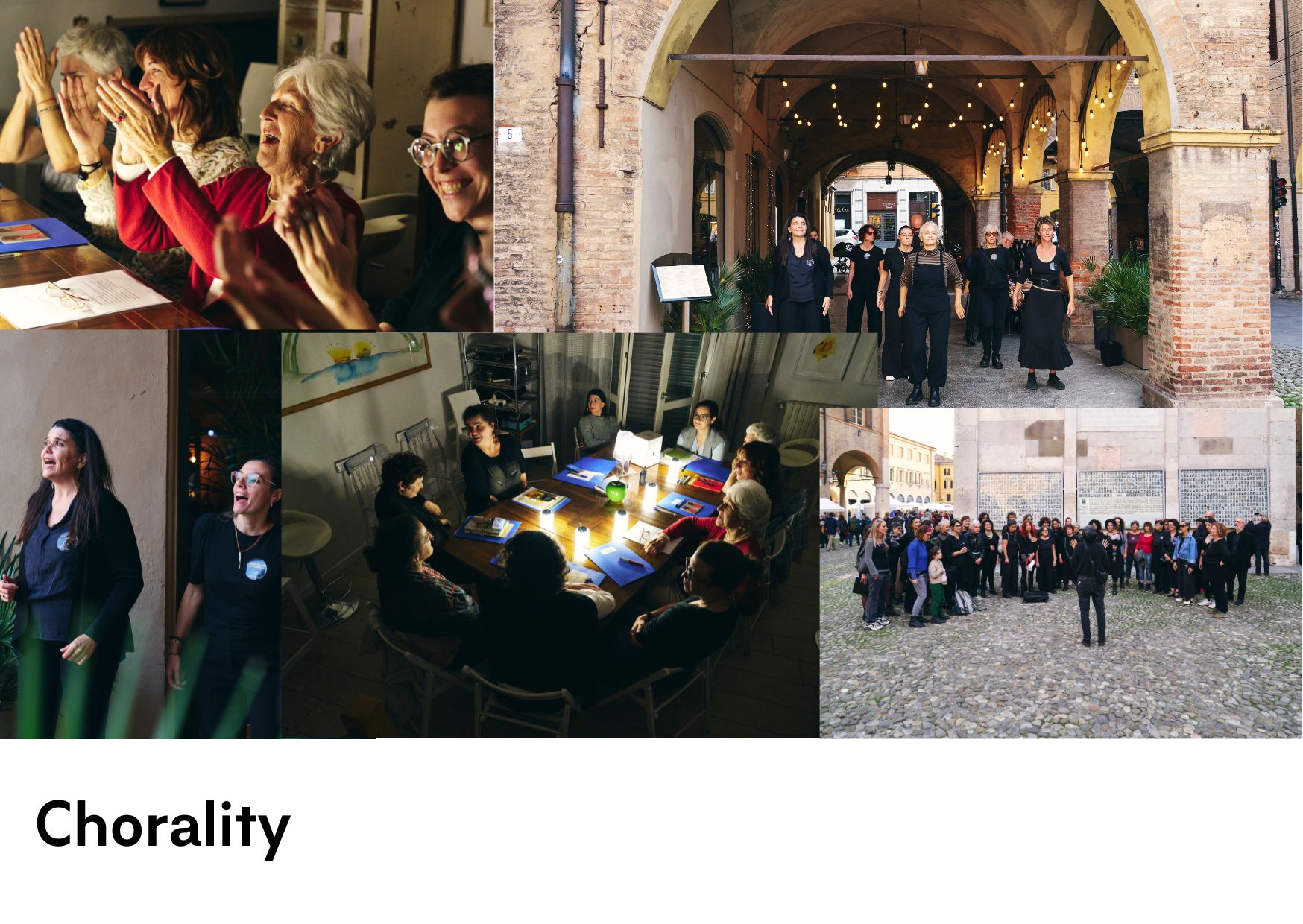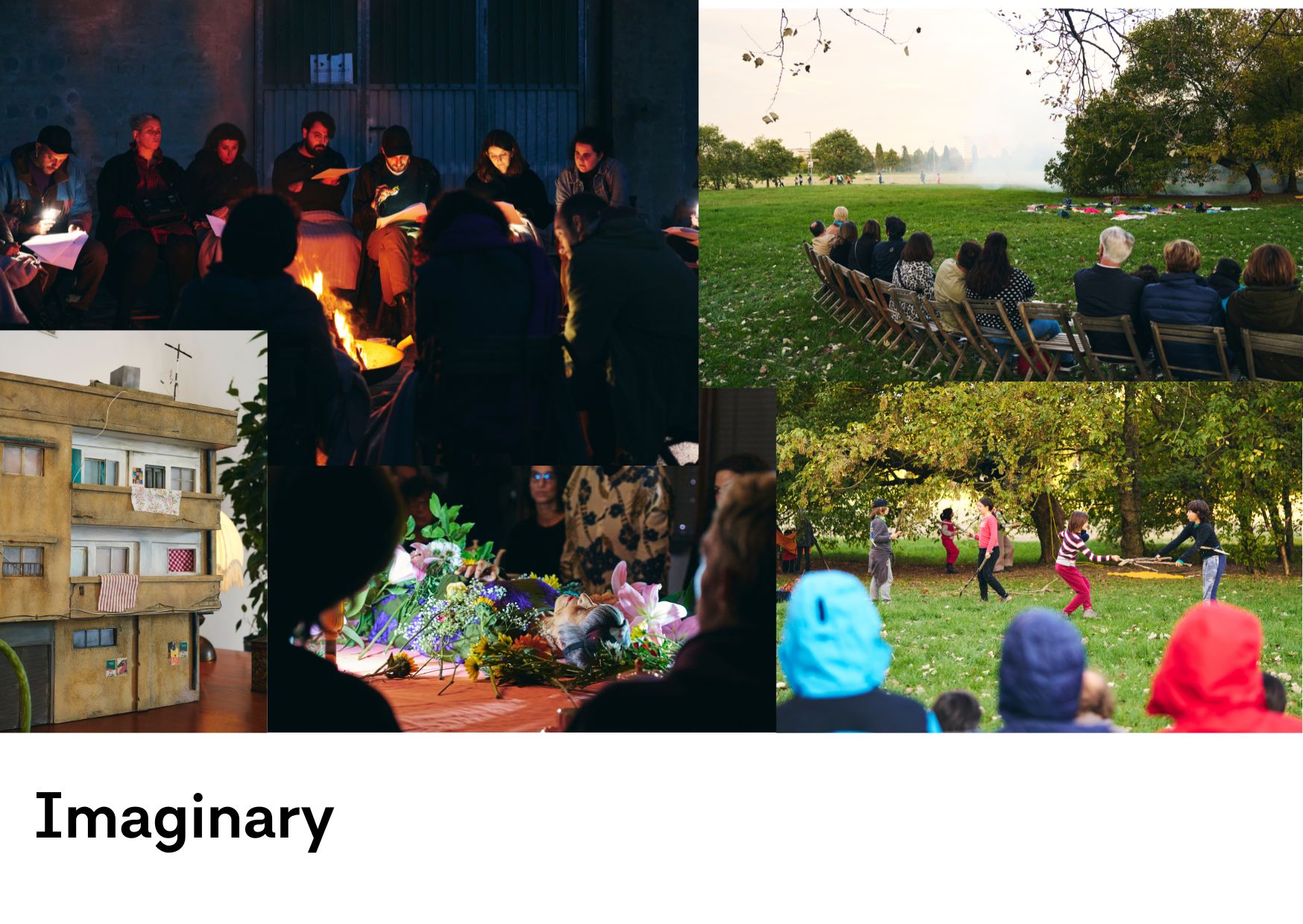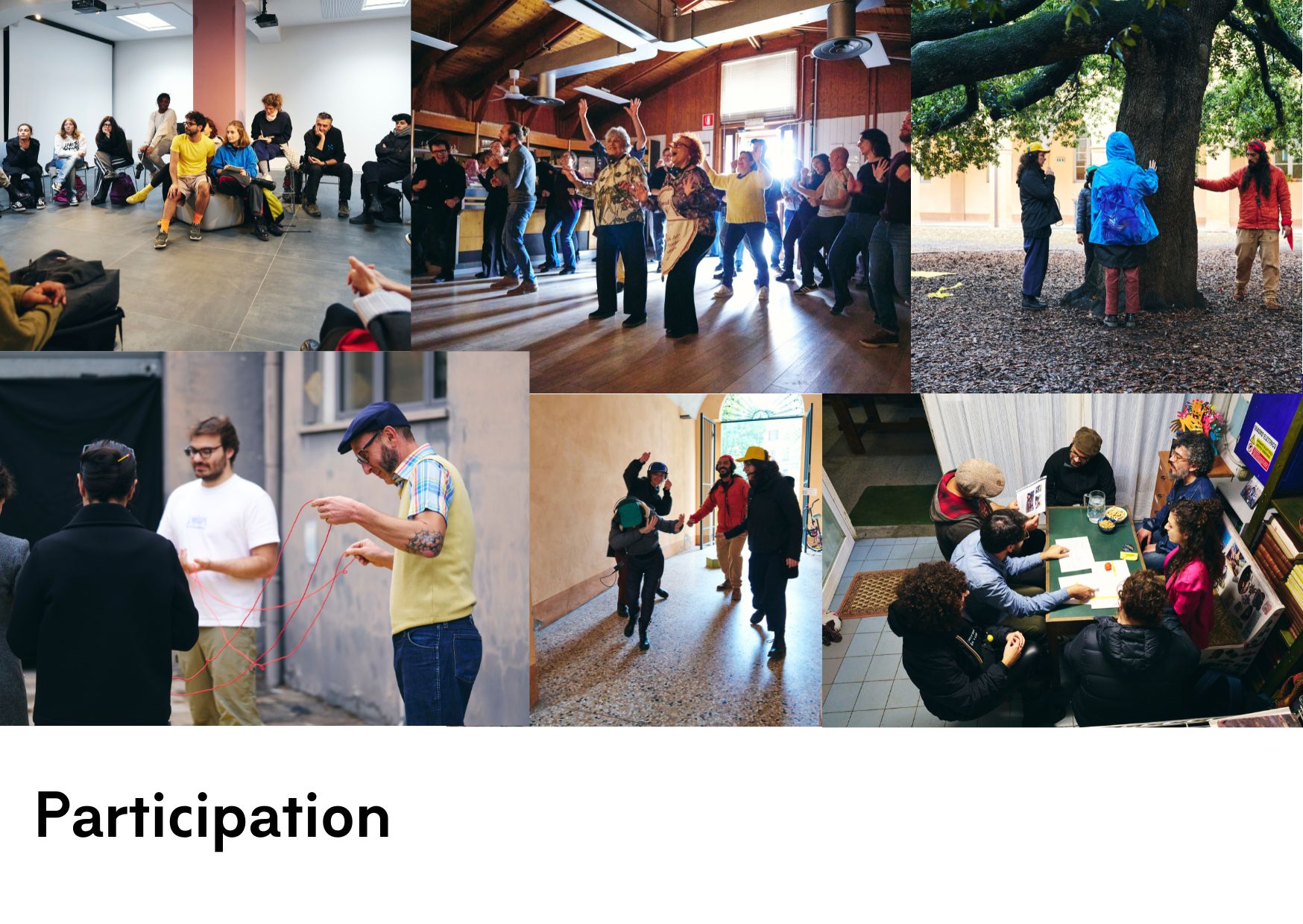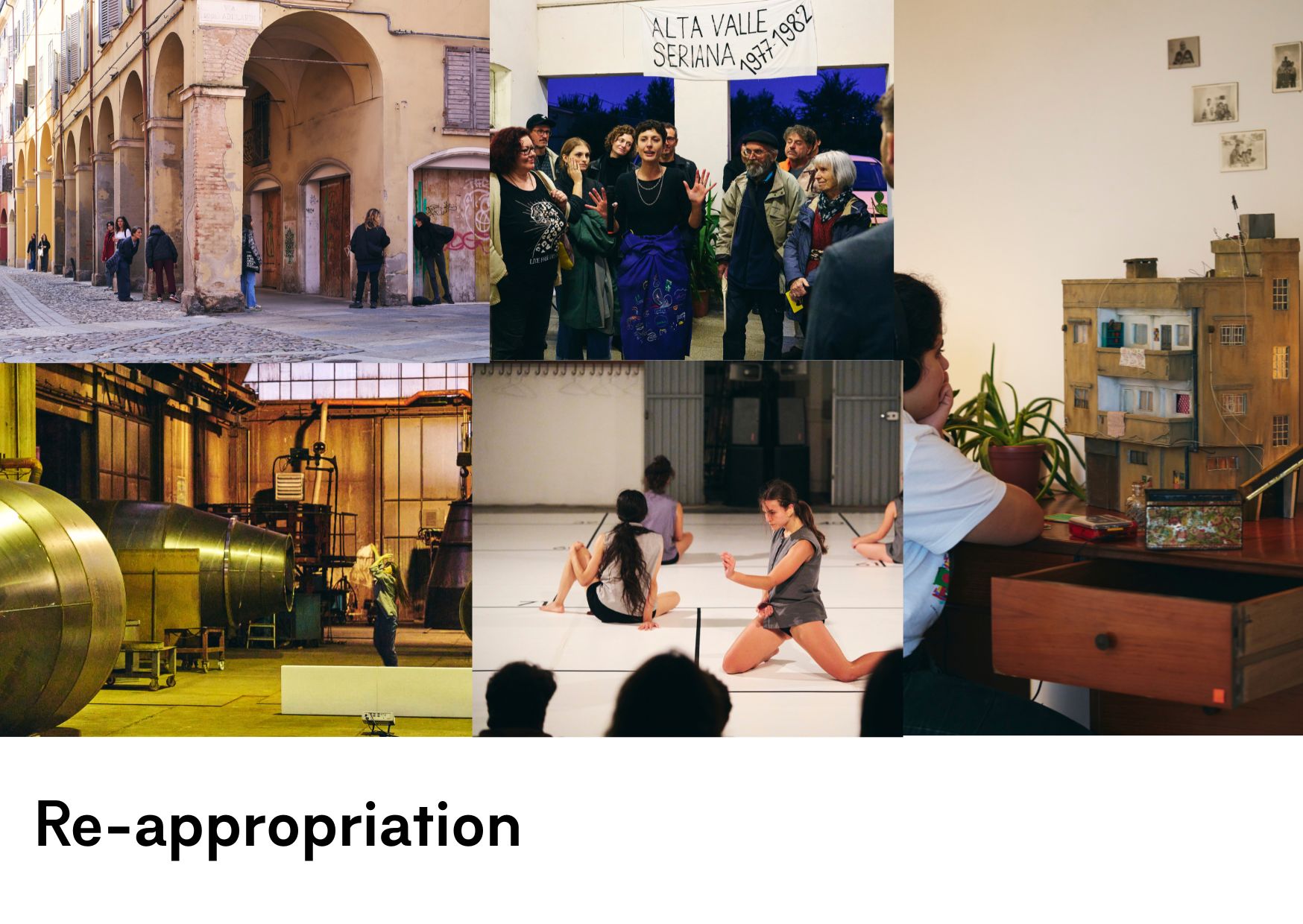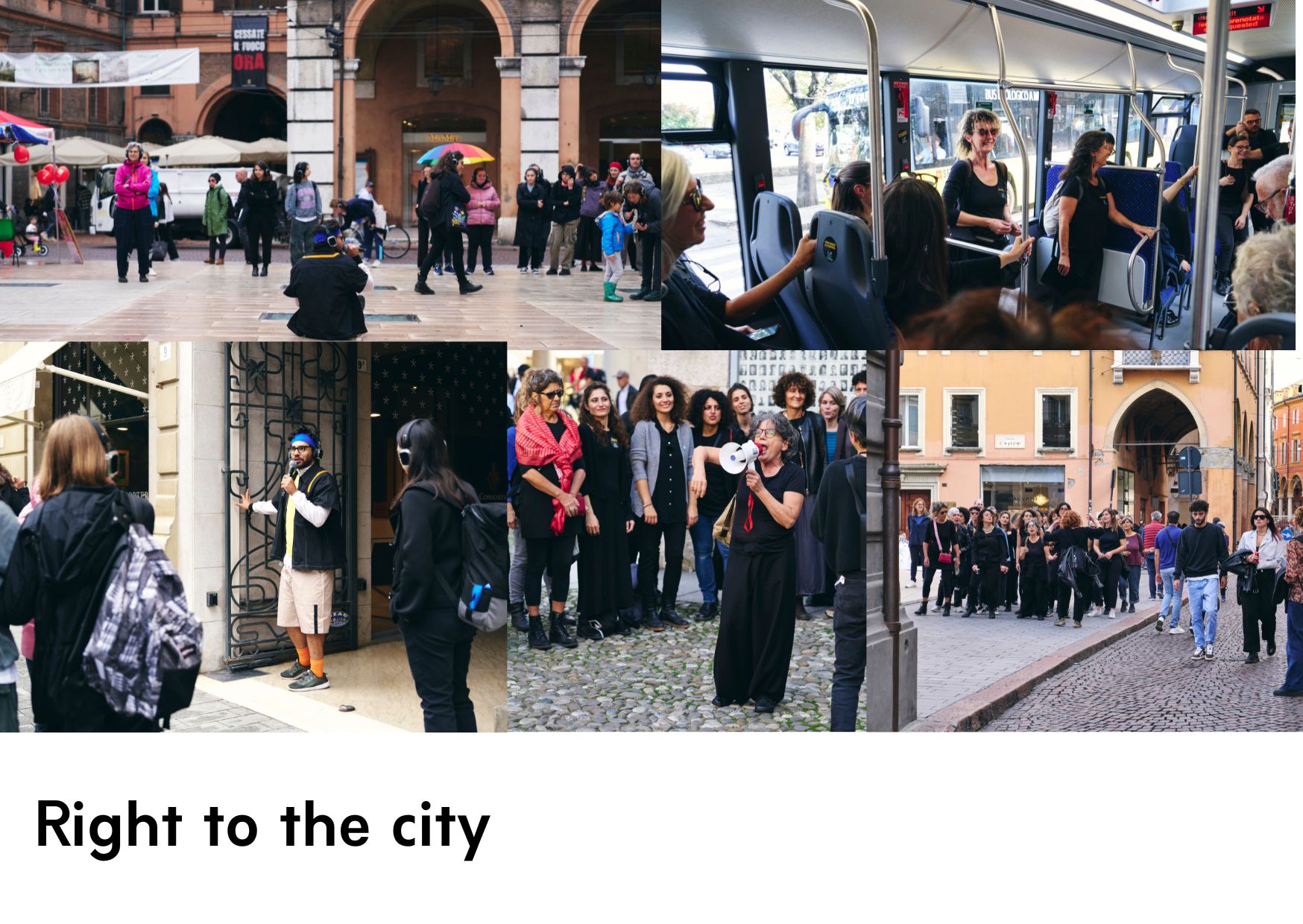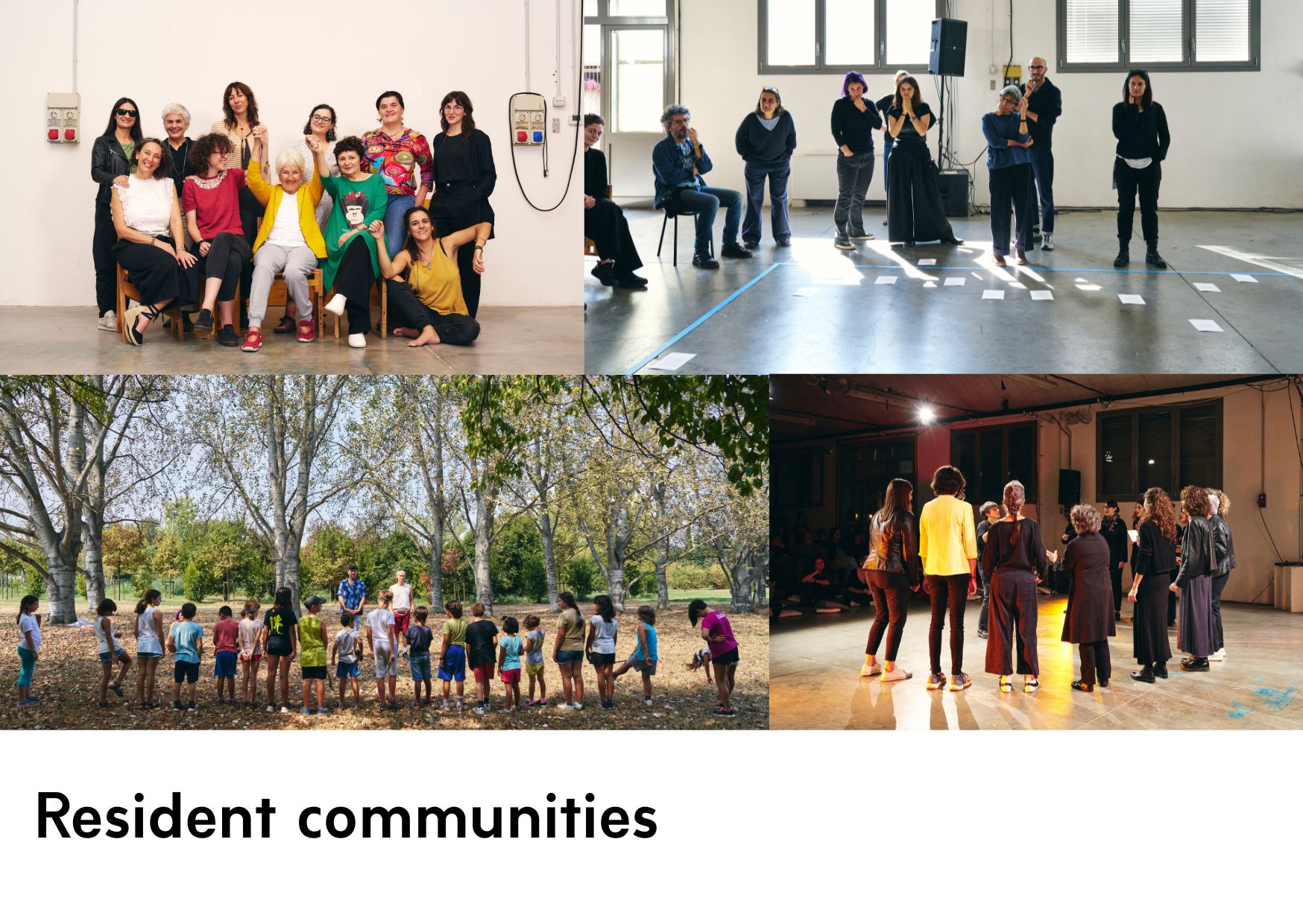Regaining a sense of belonging
Perfierico Festival
Periferico Festival - International festival of site-specific performing art
The word “Festival” is invariable in the singular and plural and is configured as the expression of a multitude, a community work, an engine of free aggregation.
Periferico (translate in en: Peripheral) represents the concentration and explosion together of this word "Festival": bringing artists and their works to places to be investigated together with the inhabiting communities and festival participants, creating unseen communities temporary in action, but permanent in thought and reflection.
Periferico (translate in en: Peripheral) represents the concentration and explosion together of this word "Festival": bringing artists and their works to places to be investigated together with the inhabiting communities and festival participants, creating unseen communities temporary in action, but permanent in thought and reflection.
Italy
Local
Modena
Mainly urban
It refers to other types of transformations (soft investment)
Yes
2024-10-13
Yes
Perform Europe (co-funded by Creative Europe Programme) 2024-2025
No
No
As a representative of an organisation
Periferico is a site-specific performing arts festival organized by Amigdala, an association and artistic collective founded in Modena in 2008, which reached its sixteenth edition in 2024. The festival explores the city and its communities through performing arts, highlighting their diverse and complex facets. Each year, Periferico changes its format, offering new ways to interpret the city through public meetings, explorations, and performances that span dance, music & theater. It creates a sense of belonging by connecting artists, local communities & different spaces. The title Presente! has accompanied the festival for the past three years. It represents a call to action, inviting us to engage as a political act, drawing from the work of performing arts scholar Diana Taylor. In 2024, the festival featured artists experimenting with participation, where performances involved local communities, asking the audience to engage actively & creatively, transforming them into protagonists. Periferico hosts complex artistic projects that engage both artists & communities in mutual understanding, emphasizing the creative process rather than just the final performance. For each project, beneficiaries & target communities are carefully identified and a precise working context is built considering the social impact generated and the involvement of audience groups with fewer opportunities. The artist residency is not seen as closed work but as an open presence in the space, including community meetings, workshops & informal moments. The 2024 edition used the metaphor of invasive plants growing in concrete cracks to symbolize the unexpected, persistent connections between communities and the city. The festival told stories of realized utopias, migrating creatures, archetypal monsters, extended families & resistance: from solitary protests against homogenization to ancient mountain struggles against land exploitation, celebrating extraordinary talents nurtured in domestic spaces.
re-appropriation
imaginary
chorality
right to the city
participation
The 2024 edition took inspiration from the dandelion for its graphic identity: a resilient, healing plant often considered a weed. As naturalist Richard Mabey writes, “Plants become weeds when they obstruct our plans or our orderly maps of the world.” The choice to draw inspiration from weeds stems from this very idea: they are creatures that disregard borders, teaching us the art of persistence & the wisdom of uniqueness. Focusing on seemingly insignificant spaces and exploring usually inaccessible urban locations (abandoned buildings, private disused spaces) are key elements of Periferico’s performances. At the same time, these explorations serve as temporary reuse strategies, aiming to enhance the city's material heritage as a means to discourage land consumption. Sustainability is also promoted through circular economy practices at all levels of the festival community. This includes using repurposed objects—collaborating with municipal recycling centers—for performance setups & festival spaces (tables, chairs), QR codes to reduce printed programs, recyclable tableware at the food area, providing free drinking water & recycling bins at all festival locations. For example, in 2024 the performance “Dear Laila” by palestinian artist Basel Zaraa was hosted in a dismissed apartment temporarily transformed in an cultural space, with the direct involvement of all inhabitants of the building, and its scenography was completely built on site with used materials from a local recycling center, instead of bringing it from abroad. Zaraa’s italian tour was coordinated with 3 other festivals to reduce flights and enhance networks.
Another essential aspect is sustainable mobility. The festival encourages cycling by providing city maps with bike lanes & a bike-sharing service available to all artists during residencies & the event. Additionally, at the festival hub—OvestLab cultural center, managed by Amigdala—a dedicated bike parking area is available, equipped for maintenance.
Another essential aspect is sustainable mobility. The festival encourages cycling by providing city maps with bike lanes & a bike-sharing service available to all artists during residencies & the event. Additionally, at the festival hub—OvestLab cultural center, managed by Amigdala—a dedicated bike parking area is available, equipped for maintenance.
Periferico Festival acts as a bridge between artists, audiences, & urban landscapes, mediated through resident communities, their collective memories & social dynamics. The quality of experience for audiences emerges through: Site-specific dramaturgies, where performances turn public spaces into storytelling arenas; a balance of large-scale and intimate works, allowing for public activation & personal immersion; multi-sensory engagement, merging sound, movement, & scenography with the urban fabric. Periferico fosters critical spatial awareness, inviting audiences to observe, inhabit, & reimagine the city. Artistic practice bridges personal emotion & collective experience through the shared moment of performance. In 2024, Walking Definition (Electrico28) turned public space into a live architectural dictionary, while A più voci (T. Djokovic) activated private homes as performative landscapes, exploring domestic writing as empowerment. Periferico is dedicated to hybrid & immersive performances that engage the experiential & sensory dimensions of the audience as part of their aesthetics. Many featured artists—such as B. Erciyas or W. Chong in 2024—propose works that require an audience in motion: walkscapes or soundscapes demand active presence & a full engagement of their perceptual system. The festival brings together globally recognized creators, whose works circulate worldwide, excelling in the advancement of socially engaged arts. The 2024 edition hosted artists from Italy, China, Latin America, Spain, Finland, Turkey, & Palestine, reinforcing its global scope. Their encounter with local communities sparks new perspectives & cultural exchanges, introducing diverse languages & vocabularies. This interaction renews the power of hospitality, fostering a dynamic space for artistic & human connection. Their high-caliber works, combined with the unpredictability of public space, generate moments of wonder & surprise, illuminating everyday spaces from a new perspective.
Since 2020, Amigdala has followed a decentralized governance model to dismantle hierarchies & create an equitable ecosystem rooted in collective intelligence & care. It prioritizes the well-being of workers, volunteers, artists, audiences & communities, developing sustainable working models in a sector where artists—especially in Italy—often face low wages & job insecurity.
Amigdala’s team operates within a learning-by-doing & peer-to-peer model, guided by a collective Value Chart that includes feminism, anti-fascism, collaborative culture, accountability, autonomy & feedback culture.
Externally, Periferico embraces co-creation as both an artistic frontier & a democratic practice. It integrates live performance into the urban fabric, enabling a collective reimagining of cities. The festival operates in disadvantaged areas, engaging audiences with fewer opportunities. Periferico chooses urban peripheries as its primary stage, where - away from established cultural structures - generative dynamics emerge & new ways of inhabiting the world can be imagined.
Accessibility is a priority, with concrete measures for inclusive participation. The website complies with AgID guidelines, ensuring readability, text formatting & alternative image descriptions. A dedicated accessibility legend in the website & festival booklet details age recommendations, venue & restroom accessibility, accommodations for visually/hearing-impaired individuals, & audience interaction levels. Periferico also ensures economic accessibility, with ticket prices from €8 to €12, plus subscriptions & discounts for under-30s, over-65s & students.
As an exemplary initiative, Amigdala will publish & publicly present its Handbook on its governance system by March 2025. This document consolidates its governance model, inclusive practices & values, offering a replicable, transparent framework for organizations seeking to develop ethical, sustainable cultural ecosystems.
Amigdala’s team operates within a learning-by-doing & peer-to-peer model, guided by a collective Value Chart that includes feminism, anti-fascism, collaborative culture, accountability, autonomy & feedback culture.
Externally, Periferico embraces co-creation as both an artistic frontier & a democratic practice. It integrates live performance into the urban fabric, enabling a collective reimagining of cities. The festival operates in disadvantaged areas, engaging audiences with fewer opportunities. Periferico chooses urban peripheries as its primary stage, where - away from established cultural structures - generative dynamics emerge & new ways of inhabiting the world can be imagined.
Accessibility is a priority, with concrete measures for inclusive participation. The website complies with AgID guidelines, ensuring readability, text formatting & alternative image descriptions. A dedicated accessibility legend in the website & festival booklet details age recommendations, venue & restroom accessibility, accommodations for visually/hearing-impaired individuals, & audience interaction levels. Periferico also ensures economic accessibility, with ticket prices from €8 to €12, plus subscriptions & discounts for under-30s, over-65s & students.
As an exemplary initiative, Amigdala will publish & publicly present its Handbook on its governance system by March 2025. This document consolidates its governance model, inclusive practices & values, offering a replicable, transparent framework for organizations seeking to develop ethical, sustainable cultural ecosystems.
Periferico fosters multiple levels of engagement with local residents. The first involves direct participation in co-creation processes within the artistic projects presented at the festival. Over the years, the festival has nurtured communities that have become permanent artistic residents at OvestLab (Amigdala’s headquarters and festival’s hub). Examples include A più voci (Tolja Djokovic), created with a community of women; & L’occhio selvaggio (DOM-), developed with the children. These "resident communities" continue to collaborate with Periferico & have also developed independent projects. For us, this is a major achievement in terms of activation & autonomy, demonstrating the festival’s long-term impact in fostering sustainable cultural initiatives. A key pillar of the festival is also its volunteer network—a strong community of over 40 people who support the Amigdala team in organizing events. Another fundamental form of engagement is the hosting of performances. Periferico activates a variety of urban settings, from disused & active factories to public & private buildings, including homes. All venues are offered free of charge, allowing the festival to explore the city in new ways & deepen awareness of urban spaces. Property owners of abandoned sites, associations, citizens, & public institutions all contribute spaces, reinforcing connections between places and communities. The territorial researches take shape in a new geography of the city created by the festival through different actions: in-depth study of the history of the territory & the ongoing processes of transformation; direct involvement of inhabitants in artistic processes; & collective moments of confrontation to deepen the knowledge of the places. Through performances, the spaces traversed allow for new views of everyday places that are often underestimated, reinforce a sense of belonging, and activate a collective consciousness and a purposeful critical sense about transformations & the city.
The hybrid and cross-disciplinary nature of Periferico enables relationships with stakeholders from diverse fields, such as urban planning, industry, digital innovation, education, social work, publishing, visual arts, and tourism. This broad approach fosters intersections between the arts and stakeholders from other sectors, enriching the festival’s impact and broadening its audience. Moreover, Periferico structures its programming across multiple locations, making the relationship with spaces key in diversifying stakeholders. At the local level, it collaborates closely with the public administration to enhance public spaces as common goods. It also engages a network of local actors (neighborhood committees, organizations, activists movements…), integrating them into the creative process and hosting performances in their spaces. For instance, YellowCake by Tea Andreoletti—focused on 1970s environmental movements and their relevance today—involved 12 environmental activist collectives and was hosted by an organization promoting mental health care. At the institutional level, Periferico is supported by the Municipality of Modena, the Emilia-Romagna Region, and the Italian Ministry of Culture, attesting to its national recognition. It also fosters international relations, collaborating with three cultural institutes and embassies to promote cultural exchange. In 2024, Periferico was supported by Perform Europe, strengthening a network of five festivals across three countries. Additionally, it is member of Interspazio (network of curators focused on public space interventions through the arts), Lo Stato dei Luoghi, and IETM. This multi-level engagement strengthens civic participation, fosters long-term collaborations, and transforms urban spaces into places of collective meaning. Institutional partnerships provide stability and recognition, while international networks amplify cross-cultural dialogue, expanding the festival’s impact beyond its local context.
Periferico has always embraced a strong cross-disciplinary vocation, creating & sustaining a unique space for experimentation & encounters in the performing arts. It distinguishes itself by hosting & producing transdisciplinary works that engage deeply with places, landscapes, communities, and local social energies. The festival’s artistic direction does not follow a traditional programming strategy but rather a project-based approach, fostering a convergence of knowledge & exploring meaningful interferences. Periferico’s curatorial work is conceived as a dynamic field, designing open frameworks around a wide spectrum of sensory experiences for spectators, participants, artists, partners, spaces & urban environments. This allows performances to be experienced in relation to one another. One of the festival’s long-standing focuses is the appreciation of artisanal production spaces & the theme of craftsmanship, a defining element of Modena’s cultural identity. Over the years, many performances have been hosted in active or disused production sites, weaving together artistic visions with the expertise of local artisans. In 2024 choreographer Teodora Grano presented Othermothers inside a historic, still-operational mechanical workshop, establishing a deep connection with its workers. Intertwining perspectives on transfeminism, social & environmental justice, non-violence, and peace culture, the 2024 edition of Periferico created a temporary public space where curators, artists, audiences, and communities could collectively invent new forms of citizenship through the performing arts. The festival builds a temporary community, bringing together individuals from diverse backgrounds who exchange unique perspectives on the city & the world. In this process, art reaches its highest potential, as described by Nora Bateson: allowing us to “perceive from multiple perspectives simultaneously”, opening the doors of our convictions to new, previously unimagined possibilities.
For several years, Periferico has been exploring more sustainable production models for artists and the artistic ecosystem, placing the care of guest artists and creative processes at the heart of the festival. Typically, performances within a festival follow an extractive model, where the artist is seen as a provider of a product, and communities engage only in a short-term relationship. Periferico Festival, however, prioritizes the local territory and communities, fostering an ongoing relationship curated by Amigdala, in which artists become part of an existing process. Each invited artist is asked to develop a complex project—including residencies, workshops, meetings, production, and performances—rather than simply presenting a finished work. Around each project, the festival weaves hybrid and cross-disciplinary alliances tailored to the specific context in which the artist is embedded, enhancing the creative process itself in addition to the spectacular result. For every project, beneficiaries and target communities are carefully identified, and a well-defined working environment is created, considering its social impact. The project is structured around an artistic residency, where a key figure—a local mediator appointed by Amigdala—works alongside the hosted company, acting as a bridge between artists and local stakeholders. The artistic residency, often taking place months before the festival, is not conceived as a closed-door period for artists to develop their work in isolation. Instead, it is seen as a "presence"—a way of inhabiting the space attentively and remaining open to connections. The residency includes meetings with communities, workshops, visits and explorations, interviews, celebrations, and the invitation of guests and fellow artists to foster collaborations and exchange.
The project approach of Periferico Festival is fully transdisciplinary, encompassing artistic research in its various forms (performing arts, visual arts, dance, music, and theater), morphological and urban research, and social engagement, including participatory and co-creation processes in the creation of performances. The design and implementation of Periferico Festival follow a specific methodology, which is at the core of all Amigdala’s projects. This methodology unfolds through key macro-actions, fostering a continuous interplay between learning and experimentation.
Being in the Territory: a continuous presence in the local context enables a deeper understanding of its nuances. Relationships with spaces and residents are fundamental to identifying the tools needed to grasp everyday life and establish a meaningful dialogue with the community.
Weaving Networks: fieldwork fosters connections with local relational dynamics, helping guide the festival’s activities. Building strong ties allows us to recognize the potential to connect the local context with guest artists, expanding the project’s reach beyond its immediate area. This approach enhances existing initiatives and fosters new collaborations, creating constructive dialogue between private and public entities and the community.
Creating Memory: activating collective memory and generating new ones establishes a learning process that stimulates multiple layers of interpretation, fostering creative and imaginative dimensions within the community.
Interpreting Transformative Imaginaries: active participation transforms performances into unique collective experiences, evoking emotional resonance and inspiring a forward-looking mindset. By engaging with local capacities and resources, performances encourage reflection on shared futures and amplify the role of local actors in shaping cultural transformation.
Being in the Territory: a continuous presence in the local context enables a deeper understanding of its nuances. Relationships with spaces and residents are fundamental to identifying the tools needed to grasp everyday life and establish a meaningful dialogue with the community.
Weaving Networks: fieldwork fosters connections with local relational dynamics, helping guide the festival’s activities. Building strong ties allows us to recognize the potential to connect the local context with guest artists, expanding the project’s reach beyond its immediate area. This approach enhances existing initiatives and fosters new collaborations, creating constructive dialogue between private and public entities and the community.
Creating Memory: activating collective memory and generating new ones establishes a learning process that stimulates multiple layers of interpretation, fostering creative and imaginative dimensions within the community.
Interpreting Transformative Imaginaries: active participation transforms performances into unique collective experiences, evoking emotional resonance and inspiring a forward-looking mindset. By engaging with local capacities and resources, performances encourage reflection on shared futures and amplify the role of local actors in shaping cultural transformation.
Periferico Festival takes shape through a renewed pact between curators (Amigdala), artists, and communities in each edition. To make its methodology explicit and shareable, Amigdala has developed a protocol, a unique initiative in socially engaged arts, shared with all participants—artists, communities & audiences. This tool provides a framework for ethical, situated artistic engagement, ensuring meaningful and reciprocal interactions with local communities & sites. It defines principles for co-creation, serving as a guide for artists within Amigdala’s network & offering a reference model for socially engaged artistic practices. The goal is to reflect on interdependence within this complex system—not to simplify it, but to navigate its inherent entropy with shared awareness. The protocol is a permanent beta document, designed to evolve through ongoing dialogue, structuring the work of curators, artists, and communities while expanding a common vocabulary of practices applicable in other contexts. In 2024, the protocol was the focus of a workshop with Interspazio, a network of performing arts curators. The discussion refined the tool and its applicability. The outcomes were later shared with volunteers and audiences, ensuring a collective validation process that reinforced its adaptability.
A culture of feedback is central to both festival design & reflection. Since 2022, Periferico has conducted a cultural impact evaluation, based on its Theory of Change (ToC) framework, defining key impact areas & measurable indicators. In 2024, the evaluation was carried out by AltreVelocità through sample interviews, an audience survey, and a collective feedback session involving all festival contributors—volunteers, artists, associations, and space donors. This collective retrospective gathered qualitative data, assessed strengths and weaknesses, and fostered a shared reflection on the festival’s impact, reinforcing its long-term vision and commitment to community engagement.
A culture of feedback is central to both festival design & reflection. Since 2022, Periferico has conducted a cultural impact evaluation, based on its Theory of Change (ToC) framework, defining key impact areas & measurable indicators. In 2024, the evaluation was carried out by AltreVelocità through sample interviews, an audience survey, and a collective feedback session involving all festival contributors—volunteers, artists, associations, and space donors. This collective retrospective gathered qualitative data, assessed strengths and weaknesses, and fostered a shared reflection on the festival’s impact, reinforcing its long-term vision and commitment to community engagement.
In a global context where public space is increasingly restricted, Periferico works to uphold the right to the city & spatial justice, engaging closely with Modena’s urban fabric. Through participatory artistic actions, the festival acknowledges & reimagines public and private cultural heritage. This fosters territorial cohesion, strengthening a network between residents, artists & local authorities. A key example is LOUD!, featured in Periferico 2024, an artistic intervention that involved three Italian female choirs to reclaim urban space through sound and collective female voices, and to promote alternative cartographies & inclusive narratives, fostering gender-sensitive accessibility to the city.
To counter inequalities & expand access to arts and culture, Periferico actively involves local communities, valuing their heritage & lived experiences in co-creation processes and participatory processes. In 2024, projects included:
- In A più voci, women hosted performances in their homes with dramaturg Tolja Djokovic;
- Caterina Moroni’s work with women over 70 on desire & intimacy in old age, located in a elderly community center;
- Basel Zaraa’s collaboration with Arabic-speaking residents & activists for Palestine in a dismissed building;
- Collettivo DOM- engaging 25 children in an open-air performance on adult perspectives on childhood;
- Tea Andreoletti’s project with 12 climate activists, co-choreographing a dinner performance in a centre for mental health.
To contrast the precariousness & lack of recognition of artistic labor, particularly in Italy but also worldwide, Periferico promotes stable employment, fair wages, staff training & equitable workspaces, proving the impact of artistic presence in urban & social policies. Amigdala employs 6 stable cultural workers/artists (all women, 1 under 35), while the festival counts on a staff of about 15 people. Amigdala and the festival are run through a decentralized governance model.
To counter inequalities & expand access to arts and culture, Periferico actively involves local communities, valuing their heritage & lived experiences in co-creation processes and participatory processes. In 2024, projects included:
- In A più voci, women hosted performances in their homes with dramaturg Tolja Djokovic;
- Caterina Moroni’s work with women over 70 on desire & intimacy in old age, located in a elderly community center;
- Basel Zaraa’s collaboration with Arabic-speaking residents & activists for Palestine in a dismissed building;
- Collettivo DOM- engaging 25 children in an open-air performance on adult perspectives on childhood;
- Tea Andreoletti’s project with 12 climate activists, co-choreographing a dinner performance in a centre for mental health.
To contrast the precariousness & lack of recognition of artistic labor, particularly in Italy but also worldwide, Periferico promotes stable employment, fair wages, staff training & equitable workspaces, proving the impact of artistic presence in urban & social policies. Amigdala employs 6 stable cultural workers/artists (all women, 1 under 35), while the festival counts on a staff of about 15 people. Amigdala and the festival are run through a decentralized governance model.
The Theory of Change (ToC) guiding the festival's development is structured around impact dimensions, which define criteria for evaluating results and measuring impact. Each dimension contributes to Amigdala’s vision of change, expressed through specific objectives:
GENERATING COLLECTIVE SPACES
This dimension highlights how artistic projects can create spaces for sharing, participation, & the emergence of new collective imaginaries. In 2024, the festival hosted 31 artistic projects, each working with a specific reference community spanning different ages, genders, backgrounds. It engaged 60 associations & activist collectives, contributing to public events, artistic residencies, & festival activities. Additionally, a team of 40 volunteers actively collaborated at the festival, fostering a participatory & inclusive environment.
REIMAGINING PUBLIC SPACE
This focus is on the connective & collective nature of the spaces involved, emphasizing the role of both public & private spaces as common goods. The festival activated 36 different locations, including high schools, universities, public parks, sports facilities, private homes, association headquarters, active & disused factories, streets, squares across three areas of the city. The presence of performances in these spaces directly impacts artists, communities, & audiences, while also extending its reach to indirect beneficiaries—passersby, residents, local authorities—enhancing the perceived value & visibility of urban spaces.
ADVANCING CULTURAL WORK
This advocates for recognizing artistic labor as a driver of social, urban & cultural transformation, stressing the need for sustainable conditions, including fair pay, flexible schedules & accessible learning methods. The 2024 edition involved 137 artists, of whom 119 were women & 35 under 35. Amigdala ensures fair compensation for all artists, regardless of age, while offering flexibility in work conditions & timelines to support their creative proces
GENERATING COLLECTIVE SPACES
This dimension highlights how artistic projects can create spaces for sharing, participation, & the emergence of new collective imaginaries. In 2024, the festival hosted 31 artistic projects, each working with a specific reference community spanning different ages, genders, backgrounds. It engaged 60 associations & activist collectives, contributing to public events, artistic residencies, & festival activities. Additionally, a team of 40 volunteers actively collaborated at the festival, fostering a participatory & inclusive environment.
REIMAGINING PUBLIC SPACE
This focus is on the connective & collective nature of the spaces involved, emphasizing the role of both public & private spaces as common goods. The festival activated 36 different locations, including high schools, universities, public parks, sports facilities, private homes, association headquarters, active & disused factories, streets, squares across three areas of the city. The presence of performances in these spaces directly impacts artists, communities, & audiences, while also extending its reach to indirect beneficiaries—passersby, residents, local authorities—enhancing the perceived value & visibility of urban spaces.
ADVANCING CULTURAL WORK
This advocates for recognizing artistic labor as a driver of social, urban & cultural transformation, stressing the need for sustainable conditions, including fair pay, flexible schedules & accessible learning methods. The 2024 edition involved 137 artists, of whom 119 were women & 35 under 35. Amigdala ensures fair compensation for all artists, regardless of age, while offering flexibility in work conditions & timelines to support their creative proces

